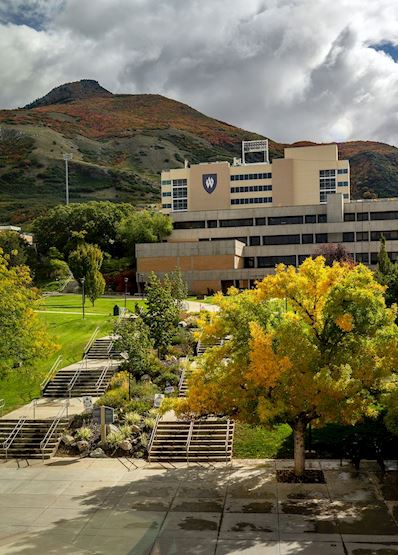Weber State surpasses 30,000 students, sets record for Hispanic and Latino enrollment
OGDEN, Utah — Defying the national trend that has seen a decline in college enrollment, Weber State University boasts its largest-ever student body and welcomes a record number of Hispanic and Latino students.
Enrollment numbers were released today in an annual report from the Utah System of Higher Education, which tracks student headcounts for fall semester.
“I’m always eager to see these numbers each year because it gives us a picture of the students we’re serving — and this year it’s a big picture,” said WSU President Brad Mortensen. “We’re excited to exceed 30,000 students, but it’s also a reminder of our responsibility to them, and it motivates us to explore ways we can better meet their needs moving forward.”
Weber’s largest student body
 The USHE report shows Weber State is now home to 30,536 students, which includes matriculated degree-seeking students and a steady increase of concurrent enrollment and early college students.
The USHE report shows Weber State is now home to 30,536 students, which includes matriculated degree-seeking students and a steady increase of concurrent enrollment and early college students.
Mortensen said WSU achieved a record 10,494 admits in the past year thanks to a commitment to waive application fees during the month of October, which the university is doing again this year. That contributed to an 8.4% growth in first-time students, he said.
“We’re bucking the national trend, and I think that has a lot to do with our return on investment,” said WSU Provost Ravi Krovi, pointing to recent studies that highlight Weber State’s affordability and ability to place students in “market-relevant” careers.
A 2022 study by Georgetown University’s Center on Education and the Workforce revealed how Weber State ranks in the top 10% among 4,500 colleges nationally for the return on investment, from 10 to 40 years after graduation. Another study from Utah Foundation this year found that “Weber State University tops the list in Utah for students’ 10-year net present value of their education.”
“We’re a destination school because we offer high-quality education that’s focused on outcomes, both in and outside of the classroom,” Krovi said. “We’re invested in student success and pushing for a better life after graduation.”
Growing Hispanic and Latino populations
Students who identify as Hispanic or Latino now make up 13% of the full-time equivalent undergraduate student body — an all-time high for that demographic at WSU. The increase moves the university closer to its goal to become an emerging Hispanic-Serving Institution, a designation given when 15% of students identify as Hispanic or Latino.
Yudi Lewis, executive director of HSI Initiatives, said she’s encouraged by the numbers.
“We’re intentionally streamlining services and resources to provide access to the Hispanic and Latino population in our region, and that’s going to benefit every student and will have positive impacts on Utah’s economic development,” Lewis said. “Reaching that 15% will better reflect Utah’s Hispanic and Latino population, which is also 15%.”
Boost in first-time nontraditional students
Among new students 25 or older, Weber State saw a 20% jump, which Krovi sees as a testament to the university’s ability to accommodate adult learners who are looking to upskill while balancing the needs of their careers and families.
“It’s that idea of lifelong learning,” Krovi said. “We have students coming back to get their education in smaller chunks, through stackable pathways that work on their timeline.”
According to WSU’s Office of Institutional Research, more students are choosing a mix of in-person and online classes, especially post-pandemic. Weber offers a growing number of certificates and degrees that can be completed online.
Record degrees awarded
Weber State awarded a record-high 6,775 degrees and certificates during the 2022–23 academic year. Most of those graduates come from the Dr. Ezekiel R. Dumke College of Health Professions, which help to make Weber State the foremost provider of health professionals to the state of Utah.
WSU is also a strong academic partner for Utah’s aerospace and defense industries thanks in part to the College of Engineering, Applied Science and Technology, which produces the second-highest number of graduates at WSU and provides an increasing number of employees to Hill Air Force Base.
Bryan Magaña, public relations director
801-626-7948, bryanmagana@weber.edu- Contact:
Bryan Magaña, public relations director
801-626-7948, bryanmagana@weber.edu